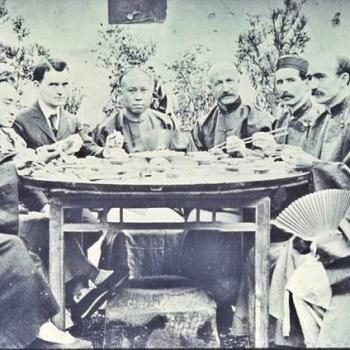
By Roland Wrinkle
Making our most desperate prayers conditional is gut-wrenchingly counterintuitive; yet it serves our faith well.
The Problem
You’re lost in the desert, it’s 110 degrees, you’re running low on water and your cell phone shows one bar and five minutes of battery left. Beyond all hope, you manage to get ahold of your best friend and you ask him to come and rescue you. Do you then qualify your quivering plea with, “But only if it won’t take you away from your family”?
A man unjustly convicted of murder is about to be executed. A prisoner’s rights champion suddenly intervenes to get him a reprieve. Does the condemned soul thank the blessed angel, yet go on to condition his response with, “But only if it won’t put the judicial system in an unfavorable light”?
Your granddaughter has just been given a terrifying diagnosis. You slam your arthritic knees onto the floor and pray like you’ve never prayed before for the child’s life to be spared. Do you then restrict your otherwise singular appeal with, “But only if…”? How can we be expected to do that?
Exegetical Caveat Regarding Counterintuitive Stuff in the Bible
If you believe that God created everything, and did so by speaking, and that a first-century Palistinian Jew got himself thoroughly and properly murdered, yet was then resurrected to bodily life as the foreshadower of the bodily resurrection of everyone else who has ever lived and will live, and that all of corrupted creation will be renewed and restored to its original perfection (Matthew 19:28)…then you won’t be testing and measuring what I have to say by Cartesian logic, Aristotelian reasoning or Newtonian physics anyway. You’ll be carefully looking for biblical truths…even really, really hard truths.
Whose Will Should We Follow?
We don’t know the mind of God. But we do know His words (kinda). He used (inspired) flesh-and-blood humans to convey his words via canonized scripture. According to the great investigator of all things gospel, Dr Luke, on the Mount of Olives, Jesus was contemplating his own torture and execution.
“[A]nd He knelt down and prayed, saying, ‘Father, if it is Your will, take this cup away from Me; nevertheless not My will, but Yours, be done.’ … Then His sweat became like great drops of blood falling down to the ground.” (Luke 22:39–44; also peek at Acts 18:21 and Romans 15:32 where Paul does the pretty much the same thing). Could John Carpenter create a more horrifying scene?
So, it sure sems to me that our response to the question about praying for the granddaughter’s life is, unavoidably and achingly, “Yes.” We are, in effect, saying “But don’t rescue the kid if that does not align with your will.” Perspiration will turn to blood. Cruciform courage will be deeply tapped.
When the great German Christian mystic, Meister Eckhart would pray, he would qualify whatever he brought before God with, “Lord, give me nothing but what you will and do Lord whatever and however you will in every way.”
Why Do We Limit Our Requests?
According to Eckhart: “Therefore, on the best of all prayers that a man can pray, there cannot be ‘Give me this virtue, or that way of life.’ But ‘Lord, give me nothing but you will, and do, Lord, whatever and however in every way.’… That is superior to the first way of praying as the heavens are above the earth.
And when one has concluded that prayer, one has prayed well, for then one has in true obedience wholly entered into God.” The deeply influential Augustine agrees: “God’s faithful servant has no desire for people to say or to give to him, or what he likes to hear or see, for his first and his greatest aim is to hear what is most pleasing to God.”
How Are We Supposed to Actually Do Something So Counterintuitive and Difficult?
The answer lies in the very passage we cited above. Right after Jesus prayed to have his life spared and qualified it with “but your will, not mine,” Luke tells us that “An angel from heaven appeared to him and strengthened him.” Just like the angels who attended Jesus immediately after he was tested by Satan in the wilderness (Matthew 4:11). We will receive precisely the same buttressing.
“With man this is impossible, but with God all things are possible” (Matthew 19:26). “I will ask the Father, and he will give you another advocate to help you and be with you forever— the Spirit of truth. … I will not leave you as orphans…” (John 14:15). God promises to carry us in and through anything and everything on eagles’ wings and with banquets splayed before our enemies. It does us little good to pray to God, without at the same time receiving God.
What Does Praying “…But Only If It’s Your Will” Teach Us About Our Relationship with God? A Trinity of Lessons
1. We Learn to Trust That God Knows What’s Best for Us Better Than We Do.
The Greek pistis, often translated as faith, is more often better understood as trust. We can utter the otherwise unutterable because we trust God. And then one of three things will happen:
1) God will give us precisely what we ask for when we ask for it;
2) He will wait until “the time is right” (Isaiah 60:22; the Greek kairos is used 86 times in the New Testament and means the right or opportune time, i.e., the time when God will act, see Mark 1:15); or
3) He has something better in store for us.
Sometimes, it just may be that God is not wanting to change our outcomes…but change our hearts.
That’s why the Enlightenment could never figure God out–not his plan, nor how he operates. Scientific verifiability and the elusive perfection of reason and logic stripped them of any ability to trust that which cannot grow in a test tube or fit neatly into a really cool syllogism.
When Jesus said, “Ask and it will be given to you, seek and you will find; knock and the door will be opened to you,” He was talking about God responding to our prayers by “giving the holy Spirit to those who ask for him” (Luke 11:13). Lots of men, with unbaptized imaginations (thanks George McDonald) who consider themselves “great thinkers” don’t ask, never seek and keep the door closed when they hear a knock.
2. We Learn to Obey (Which is a Big Deal to God).
Affirmatively and actively seeking God’s will, rather than our own, teaches us obedience. The psalmist says, “Blessed are all who yare [reverently worship] the Lord, who walk in obedience to him.” (Psalm 128:1) The gospel writers and those that wrote the letters thought that was pretty important as well.
Obedience to God proves our love for Him (1 John 5:2-3), demonstrates our trust (faith) in Him (1 John 2:3-6), glorifies Him before the watching world (1 Peter 2:12), and opens up blessings that will flow like a cataract (John 13:17).
Christ “humbled himself by becoming obedient to death—death on a cross” and we are told to imitate Christ. (Philippians 2:8). “If anyone is in Christ, he is a new creation; the old has gone, the new has come!” (2 Corinthians 5:17).
We are told that, by dying and rising in Christ, we are “transformed by the renewing of [our] mind” (Romans 12:2). And that “new creation” and that “renewed mind” is an obedient creation with an obedient mind. “Then you will be able to test and approve what God’s will is—his good, pleasing and perfect will” (Romans 12:2).
From that moment on, articulating that it is not our will which we seek, but the Lord’s will, comes more freely, less haltingly and with less pits in our stomachs. Indeed, if we really get this stuff down, and internalize it so that it becomes part of our bones and sinew, we learn to welcome the opportunity to demonstrate that we want something fiercely and agonizingly, yet we cede all outcomes to the better and perfect, yet not entirely knowable, will of the One who created us and everything else and with whom we will live and thrive eternally. Of course, I’m not there yet.
3. We Learn to Admit that We Are Not the Ones in Charge.
Throngs of believers have come, and will come, to the faith when they finally and painfully realize that they are not the one in charge (in other words, me). Robert Kohls, the late Mennonite scholar of comparative religions, concluded that the number one value Americans live by is “Personal Control Over the Environment…In the United States people consider it normal and right that Man should control Nature, rather than the other way around.” (Values Americans Live By, L. Robert Kohls, Meridian House International, Washington, D.C. 1984).
By asking God to rescue those who are most important to us when they are in big trouble… but then pulling up short on the beseeching (“But only if it is your will”), we are acknowledging that God is in charge. It is his will we seek, rather than our own. And this is so because God is going to do a better job of actualizing the best future for ourselves and our loved ones than we ever could. Between the infinite and the finite, always bet on the infinite.
Our Imitation of Christ
When I tag onto my per diem prayers Eckhart’s contraction, “Lord, give me nothing but what you will and do Lord whatever and however you will in every way,” my stomach gets queasier and queasier the graver and graver what it is I’m asking of God. I can feel a quantum of earnestness draining out of me…but I do it. I do it because that is how prayer works.
Jesus probably wasn’t too thrilled about his impending trip from Gethsemane to Gabbatha to Golgotha either. But he asked to have that terrible cup lifted from him only if it was His Father’s will. Great tests tend to teach great lessons. This is a big one.













